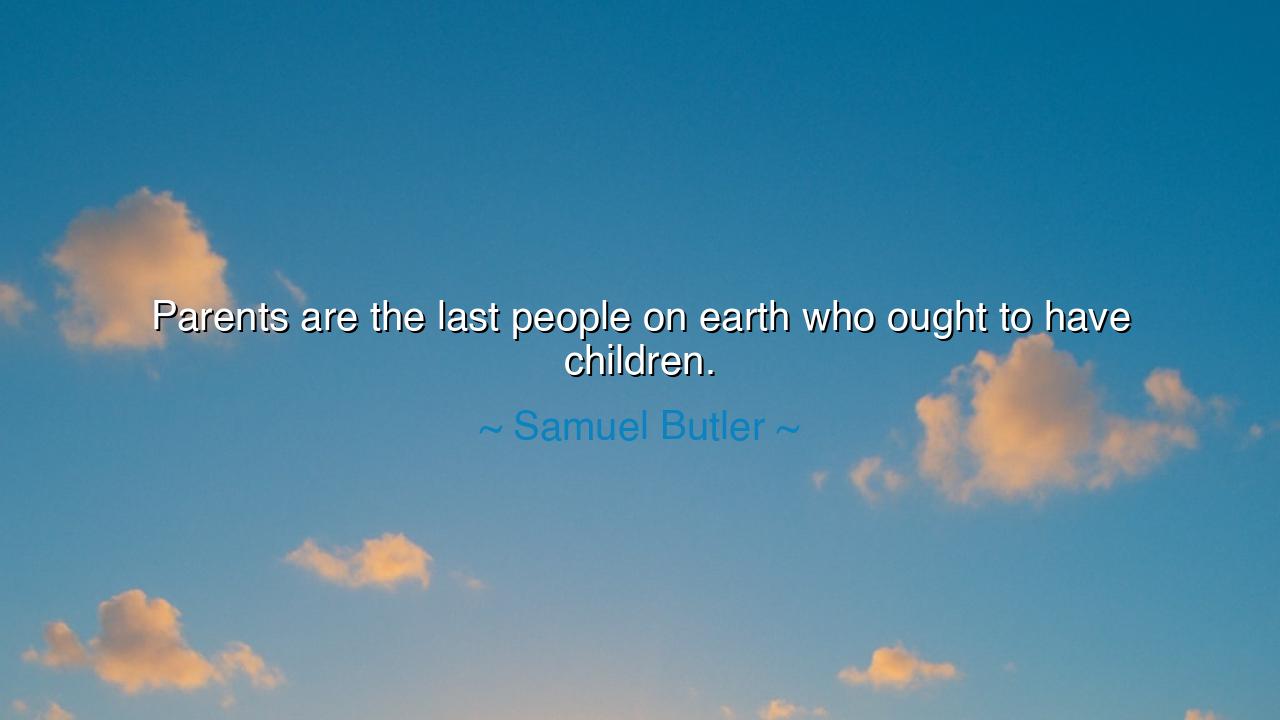
Parents are the last people on earth who ought to have children.






In the ever-shifting tapestry of human existence, the roles we inherit and the responsibilities we shoulder are not always as clear-cut as we may hope. Samuel Butler once remarked, “Parents are the last people on earth who ought to have children.” Though this statement may strike us as bold and perhaps even unsettling, it holds within it a profound reflection on the nature of parenthood, responsibility, and the human condition. Butler, in his usual irreverent style, challenges the traditional assumptions we hold about parenthood and questions whether those who bring new life into the world are truly equipped for the weighty task of raising it.
In the ancient world, parenthood was seen as a sacred duty, a role filled with reverence and wisdom. The Greeks, in particular, believed that a parent’s role was to teach and guide the next generation in the ways of virtue, wisdom, and knowledge. Socrates, the great philosopher, had children of his own, and though his life was dedicated to the pursuit of wisdom, he often emphasized the importance of passing down this wisdom to younger generations. Yet, even Socrates, with all his intellectual prowess, recognized the difficulty of raising children. Plato, his student, argued that good governance required the cultivation of virtue in the youth, and this, he believed, started with the quality of the parents. It was not enough for one to simply have children; one needed the wisdom and virtue to raise them properly.
Butler’s words bring us face to face with a reality that many of the ancients may have only glimpsed—parenthood is not a simple extension of one's own life, nor a guarantee of happiness and fulfillment. Raising children, as many ancient philosophers would admit, is a deeply complex task, one that requires not just the capacity to nurture, but the wisdom to know how best to guide a young soul through the trials of the world. The ancient Romans, with their emphasis on the concept of virtue, often considered the task of parenting as part of a greater social responsibility—it was through the careful raising of children that a society maintained its moral fabric.
Consider the story of King Solomon, whose wisdom was renowned, and yet, despite his profound understanding of justice, he struggled with the disorder in his own household. His sons, despite being heirs to a great kingdom, fell into folly, and the kingdom itself eventually fractured under their leadership. Solomon’s story is a reminder that wisdom does not necessarily translate into successful parenting, for the challenges of raising children are shaped by forces far beyond mere intellectual ability. What Butler suggests, in his biting way, is that parenthood demands more than wisdom—it demands the ability to navigate the uncertainty, the failures, and the emotional turbulence that accompany the raising of a new generation.
The lesson in Butler's statement is one of humility and awareness. It is easy to view parenthood as a natural progression of life, as if becoming a parent is an inherent right. However, the reality is that raising children requires self-reflection, dedication, and an understanding of the complex and often unpredictable nature of human development. Parenthood is not a given; it is a responsibility that requires constant self-examination and growth on the part of the parents. Butler’s words challenge us to recognize that bringing a child into the world is not enough; it is how we raise that child that matters—how we guide them with wisdom, compassion, and understanding.
In our own lives, we must embrace the notion that parenthood is not simply about creating life but about nurturing it in ways that cultivate virtue and understanding. We must acknowledge the challenges that come with raising children, for it is not an endeavor for the faint-hearted or the unprepared. It requires not just love, but also the wisdom to know when to let go, when to teach, and when to simply listen. In a world that often equates parenthood with the physical act of reproduction, Butler’s words remind us that parenting is a lifelong journey, one that demands patience, growth, and adaptation.
Therefore, the practical action we can take is one of preparation and reflection. If we are to take on the mantle of parenthood, we must not do so lightly. We must ensure that we are prepared not just physically, but emotionally and intellectually for the task at hand. Just as the great philosophers of old, like Socrates, engaged in constant self-examination, so too must we constantly reflect on our roles as parents, striving to better understand not only our own flaws but also the needs and potential of the children we bring into the world. Parenthood is not an end, but a continuous journey of growth, and it is through this journey that we, as parents, find our true strength.






AAdministratorAdministrator
Welcome, honored guests. Please leave a comment, we will respond soon